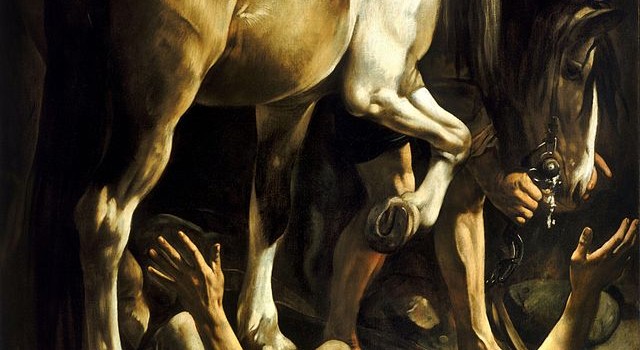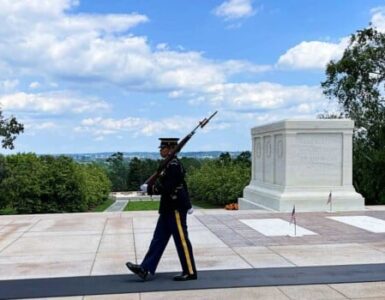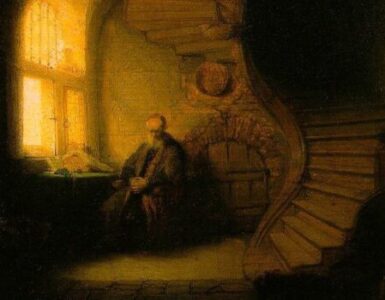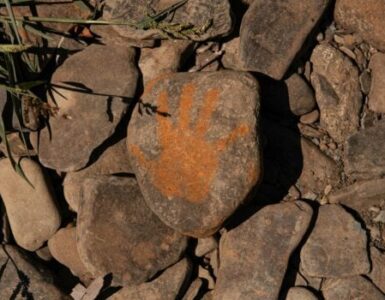St. Paul, known as the Apostle to the Gentiles, was born in the city of Tarsus, a Roman city, thereby giving him Roman citizenship. At his circumcision, he was given the Hebrew name Saul. At a young age his parents sent him to Jerusalem to be instructed in the Mosaic Law under the greatest Rabbi of his time, Gamaliel.
Saul was an excellent student and as a Pharisee was respected for his great intellect and zeal for the Jewish faith and traditions. Because the Jews had a rule that their children should learn a trade along with their studies, Saul learned to make tents. This is a trade that provided him with the finances he needed later in his life to travel and evangelize. Because of Saul’s great zeal for Jewish law and traditions, he was very upset about his Jewish brethren who were following the New Way, as Christianity was first called. So, thinking that he was serving God, Saul became the worst enemy of Christians. He hunted them down and dragged them out of their homes, imprisoning them and even having them killed. In fact, Saul was a witness to the stoning of the first Christian martyr, St. Stephen. Because Saul was a leader, he stood by and watched as those stoning Stephen laid their cloaks at his feet. It’s very likely that Saul ordered Stephen to be stoned.
Saint Luke’s recording of this story in his book of Acts is not merely an historical account. While drawing his last breath, Stephen called out to God to forgive those that were stoning him. St. Augustine later declared that had Stephen not prayed, the Church would have never had the great Apostle Paul. For it was Stephen’s prayer that planted the seed which later helped Saul on his path to conversion.
Saul’s conversion occurred when he was on his way to the city of Damascus. He had gone to the high priest and the Sanhedrin for a commission to allow him to go where he knew there were many new Christians, to arrest them and take them back to Jerusalem for trial. The journey to Damascus took about two days by horseback. When he and his men were very near the city, they were suddenly surrounded by a light so bright that it knocked Saul to the ground. The account of what happened then is related in the book of Acts, chapter 9. “They heard a voice from heaven that said: ‘Saul, Saul, why do you persecute Me?’ And Saul said, ‘Who are you, Lord?’ And He said, ‘I am Jesus, Whom you are persecuting; but rise and enter the city, and you will be told what you are to do.’ The men who were traveling with him stood speechless, hearing the voice but seeing no one. Saul arose from the ground and when his eyes were opened he could see nothing; so they led him by the hand and brought him into Damascus.
“For three days he was without sight and neither ate nor drank. There was a disciple there named Ananias. The Lord said to him in a vision, ‘Ananias.’ And he said, ‘Here I am, Lord.’ And the Lord said to him, ‘Rise and go to the street called Straight, and inquire in the house of Judas for a man of Tarsus named Saul; for behold, he is praying. And he has seen a man named Ananias come in and lay his hands on him so that he might regain his sight.’ But Ananias answered, ‘Lord, I have heard from many about this man, how much evil he has done to thy saints at Jerusalem; and here he has authority from the chief priests to bind all who call upon thy name.’ But the Lord said to him, ‘Go, for he is a chosen instrument of Mine to carry My name before the Gentiles and kings and the sons of Israel; for I will show him how much he must suffer for the sake of My name.’
“So Ananias departed and entered the house. And laying his hands on him he said, ‘Brother Saul, the Lord Jesus who appeared to you on the road by which you came has sent me that you may regain you sight and be filled with the Holy Spirit.’ And immediately, something like scales fell from his eyes and he regained his sight. Then he rose and was baptized, and took food and was strengthened.” From that time forth, Saul went on to preach about Christ. Because he was so well-known as a Pharisee and was now evangelizing for Christ, Saul began being persecuted by his Jewish brethren in the same way he had been persecuting the Christians. At some point he decided to start using his Roman name, Paul.
After spending some time with the disciples of Christ in Damascus, God called Paul to Arabia where he spent at least two years or more in the desert. It is believed that this is where Paul had visions much like the vision St. John writes about in his book of Revelation. The Lord prepared Paul to teach the Gospel, and when Paul returned from the desert, after a short stay in Damascus, he went directly to Jerusalem where he met with Peter, our first pope, and some of the other Apostles, to receive Peter’s blessing before he started on his ministry. Paul spent the rest of his life traveling and spreading the Gospel of Jesus, establishing churches and teaching others to lead in his absence. Paul’s epistles to the churches that he established make up over one-fourth of the New Testament. He truly is the greatest missionary in Church history.
From Johnnette Benkovic’s Graceful Living: Meditations to Help You Grow Closer to God Day by Day
For the sake of Christ, then, I am content with weaknesses, insults, hardships, persecutions, and calamities; for when I am weak, then I am strong.
— 2 Corinthians 12:10
Dear St. Paul, I wish I could say that I am content with weakness, mistreatment, distress, persecution, and difficulties, but that is not the case. All too often I complain at the least struggle or trial. Pray for me that I obtain the grace I need to endure all things for the sake of Christ. Help me to see that when I am most powerless, Christ can fortify me if I surrender my suffering to Him. May the strength of Christ fill me, and may I embrace the Cross with valor and conviction.
Lessons
There is much we can learn from the conversion of St. Paul. One lesson is that we should never judge others. St. Paul, the worst enemy of the early Christians, would seem to be the most unlikely convert to the Church. But God had a plan for Saul, just as He does for each of us. We never know how some small thing that we may say or do will affect another person. When Paul watched Stephen die a holy death, praying for his persecutors, it had to have an impact on him. And Stephen’s prayer was heard by God. The seed that Stephen planted by his Christian forgiveness of his enemies helped in the conversion of St. Paul. We are all called to be evangelists, to plant seeds of faith wherever we can — in our families and our work places. We never know when something we do or say might transform another or even bring a great saint and missionary to the Church like St. Paul.
Prayer
Dear Lord Jesus, we thank you for St. Paul and his tremendous witness in the early Church that is still impacting us today. We pray that You will bring others into today’s Church — our separated brethren, who like Paul are so often misguided, and also like St. Paul are zealous in their persecution of Catholics. We pray that You will bring them back to the one fold and that through their zeal for the faith, millions will come to the fullness of Truth. In Your holy name we pray. Amen.
















